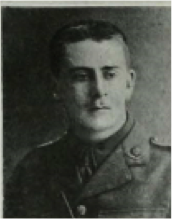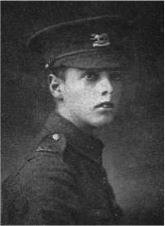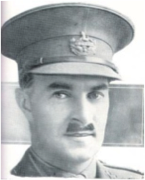Baptists soldiers served in the First World War
Jonathan Barr unearths stories of Baptists who fought on the frontline
The First World War shook the community of British Baptists to its core - as it did the whole country - pulling young women and men away from their congregations, tearing families apart and leaving in its wake a trail of gravestones, war memorials, and bad memories.
We can never fully comprehend the suffering endured by those who served - our lives are not the same as theirs - but through the records of the period we can sometimes peer behind the veil of time and distance, and catch a glimpse of their stories. Stories of ordinary people in extraordinary circumstances. Stories such as these.
Duncan Hepburn Gotch
Died - 11/03/1915, aged 23

Duncan Hepburn Gotch was born in Kettering, on 25 August 1891, into a family well known in the Baptist denomination for their support and participation in the Northamptonshire Baptist Provident Society.
He was a scientist. After completing a degree in natural sciences at Gonville and Caius College, Cambridge in 1913, he was appointed in the Imperial Bureau of Entomology, South Kensington, as an assistant. A bright career of scientific research beckoned.
When the First World War broke out Gotch, like many others, enlisted in the armed forces. After a period of training, he was commissioned as Second Lieutenant in the Worcestershire Regiment, and by January 1915 he was serving on the Front in France. He was killed in action barely two months later, on 11 March 1915, at the Battle of Neuve Chappelle.
A fellow officer wrote of him: “He had only been with us a month or two, but in that time, by his cheeriness, by his keenness, and by his hard work and enthusiasm we had all got to like him immensely. His cheerfulness was catching ............. He was very plucky and would insist on exposing himself unnecessarily, generally in the hope that he would spot the enemy or some better place for his platoon.
"His loss is a real one for the regiment, for he was one of the right stuff and of the sort we want in the Worcestershire Regiment. A brave, cheery, kindly, popular officer and we can ill afford his loss.”
Gotch's younger brother, Davis Ingle Gotch, enlisted the very day that the family received the news. Serving with the Northampstonshire Regiment, he won a Military Cross in January 1917, was taken prisoner of war during the German Spring Offensive, before being repatriated on 18 December 1918. During the Second War he served with the Gloucestershire Regiment as a Captain. His sister Dorothy, served as an army nurse caring for the soldiers coming home.
Hubert Hopkin Morgan
Died 30/03/1918
Hubert Hopkin Morgan, born in 1896, came from Nelson, Wales, where his father owned a coal mine. He was educated at the Penarth Tutorial School and Bloggs School of Commerce, Cardiff, and like the rest of the family, he was a member of the local Baptist Church.
When the First World War broke out, Morgan, aged 18, enlisted as a trooper in the 1st Life Guards, and was commissioned into the Manchester Regiment the following year. That same year he took the opportunity of a period of leave to marry.
Morgan served throughout the war in a variety of roles, including as instructor at the 5th Musketry School in France. In spring 1918 he was ordered to the front to help repel the German offensive. He was killed by a German shell on the morning of 30 March.
Mrs Morgan received a letter of consolation from Lieutenant Colonel Horn, which said: “Mrs Morgan – you will have been officially informed of the death of your husband in action on March 30th. He was killed instantaneously by a shell during an enemy bombardment of our trenches east of Amiens.
"It will be some consolation to you to know that at the time he was gallantly helping to stop the enemy advance at a critical time. I regret I did not know him personally, as I only took command here on March 26th, but his death was keenly felt by the staff, who desire me to offer you their deepest sympathy.”
William Dakin Freeman
Died 15/05/1915, aged 18

William Dakin Freeman was born in 1896 in Liverpool, Nova Scotia to the Revd Dr John Dolliver Freeman, and his wife Clara.
The family moved to Leicester, England while he was still very young. He father, a Baptist Minister, took a position at Belvoir Street Church, Leicester.
War was declared just as Freeman was graduating from school. Freeman enlisted at once, along with ninety other young men from the Church. He spent seven months training in Luton, and Bishops Stortford, Hertfordshire, before going to France in March 1915. Freeman's father was in Southampton to see him off.
Just two months later, Freeman's parents received the news that he had been killed in action in Belgium.
They wrote in
The Baptist Times: "We thank God for our dear boy's beautiful life. We regard his heroic death as a sacrifice on behalf of the liberties of mankind."
Arthur Leslie Walter Newth
Survived the war

Arthur Leslie Walter Newth was born in Bristol to a family that was solidly Baptist; he attended the City Road Baptist Church, where his parents were long standing members, just as his grandparents had been. His grandfather, the Revd. Walter J Mayern, was once the minister.
Newth was commissioned into the Gloucester Regiment in 1914 at the age of 18. In October the following year, Newth wrote his parents that he had taken part in 'a little affair.' It earned him the Military Cross.
The citation read:
"For conspicuous gallantry on the night of 6th-7th October 1915, at Hebuterne. A party of the battalion was mending wire in front of the trenches when the enemyopened a heavy machine-gun and rifle fire. When the party had retired to the trenches it was discovered that one man was missing and Lieutenant Newth, closely followed by a Serjeant and a private of the battalion, immediatelywent out again in face of the heavy fire. They found the missing man wounded and entangled in the wire, released him, andbrought him in."
Newth continued to serve throughout the war, and remained an officer of the Gloucester Regiment afterwards.
Herbert Hiskett
Died 21/07/1917
Herbert Hiskett was born in St Albans in 1897, the youngest son of boot makers William Henry and Emma Hiskett. He was educated at the Hatfield Road school, and St Albans Grammar School, and like the rest of his family attended the Tabernacle Baptist Church, where he was Sunday School teacher and mission secretary.
Hiskett went on to work for the Inland Revenue. In February 1916, however, he obtained release from his position to join the Bedfordshire Regiment. He saw a good deal of fighting, particularly at Arras in the offensive of April 1917 where he went ‘over the top’ four times in as many days. On 21 July 1917, Hiskett was killed by shell fire when he went out to collect the rations for his company.
********************************************
I could go on and on, for there were many Baptists who served in the conflict. My own church, Bloomsbury Central Baptist, saw so many go off to battle that there was talk of the “Bloomsbury Battalion.” It wasn’t just young men either, for many women served dutifully and sacrificially during those tumultuous years.
Perhaps your church, in some seldom visited closet somewhere, has a copy still of its magazine from the period. Have a read; you may be surprised at the story they tell.
The Commonwealth War Graves Commission will give some details about where the soldiers fought: www.cwgc.org
To link names on war memorials to the stories of soldiers, visit http://www.roll-of-honour.com/
Searching local newspapers is also worth a try http://www.britishnewspaperarchive.co.uk/
Jonathan Barr works for the Commonwealth War Graves Commission and is a member of Bloomsbury Central Baptist Church
Baptist Times, 31/07/2014